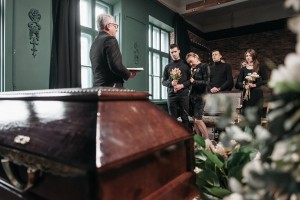
What happens at a funeral?
With the range of traditions and cultures in New Zealand today, there are many different ways to say goodbye to a loved one who has died. One of them is a funeral. A funeral is a structured ceremony for family and friends to honour and celebrate the life of their loved one. A funeral also meets our human needs and provides a safe environment to acknowledge loss and grief.
What is the first step of organising a funeral?
The beginning point is to approach a local Funeral Home of your choice. They are available 24/7. The Funeral Director (FD) will meet with the immediate family to discuss and implement all aspects of the funeral. They will uplift and care for your loved one and help with visitation, services, burial or cremation. They will also appoint a celebrant to meet with the family to plan and facilitate the service unless the family wishes to have another person of their choosing.
Where can a funeral be held?
A funeral is a traditional service that can be religious, secular or a blend. It can be held at a funeral home chapel, a place of worship or a location of your choice.
When do you usually have a funeral?
Today funerals are usually held several days after the death of your loved one, sometimes up to seven to 10 days. This is often determined by the place of death and/or the distance family and friends have to travel. Your FD will discuss this in the first meeting, which will guide them in caring for your loved one’s body for the required time.
Is the body present at the funeral?
Yes, the body is present at the funeral service, most often in a closed casket, occasionally open. The FD will discuss the timing of the closing of the casket with the family to allow for the last viewing of their loved one.
What happens during a funeral service?
The casket may already be in situ, or the family may choose to carry their loved one into the service. The FD and celebrant will check all guests are inside and seated. Music is played, and guests stand as the family enters. The family can enter with the celebrant, or if pallbearers carry in the casket, the family can follow. An order-of-service is followed, including eulogies, tributes, songs, readings and prayers (if religious).
What happens after the service?
Whether a burial or cremation takes place, the celebrant will do a committal, which is a brief and small ceremony for family and friends to say goodbye to their loved one’s body.
If your loved one is being cremated, the celebrant will do a committal towards the end of the service. Family can then choose to travel with the hearse to be present for the cremation. Most often, the family remain at the venue to be with guests for refreshments. Then, their loved one is driven away to the crematorium by the FD.
If a burial is part of the proceedings, the celebrant will do a committal grave-side. At the cemetery, the sexton will have had the plot excavated and the soil and surrounds suitably covered. Pallbearers carry the casket from the hearse to the site and lower it onto supports above the plot. After the celebrant’s committal, the pallbearers slowly lower the casket into the ground using sticks and straps, or it is lowered mechanically.
Once the casket is in the ground, family and friends often put a handful of soil onto it and maybe flower petals. Occasionally family fill in the plot with shovels which can be very healing. If not, the plot is filled in mechanically after family and friends have left. The burial plot is marked with the deceased’s name (usually a small wooden cross). A headstone is often installed approximately a year later and can have its own special unveiling ceremony.
What is the final part of the service?
It is customary to join family and friends for refreshments at the end of the funeral service. This can often be held before the journey to the cemetery/crematorium or afterwards.
Celebrant Aoteraoa Funeral Celebrants
Celebrant Aoteraoa Funeral Celebrants can create and conduct a service that reflects your family’s wishes. They will listen deeply with empathy during a time of loss and make helpful suggestions. CANZ funeral celebrants are independent, and in most instances, can provide a secular or spiritual/faith blended service. They are professional, experienced and abide by a code of ethics.
Find a CANZ Celebrant here to help you with the ceremony.
